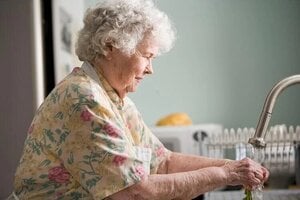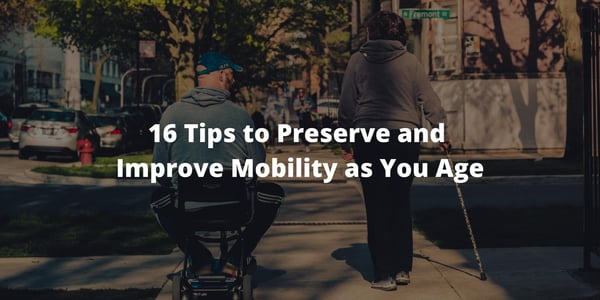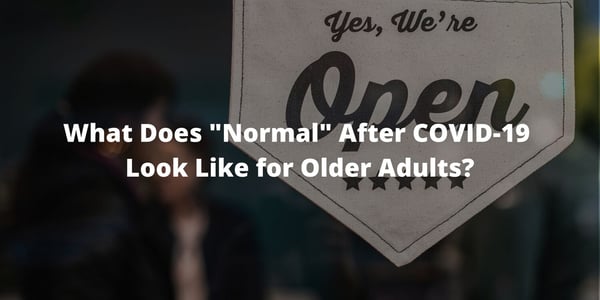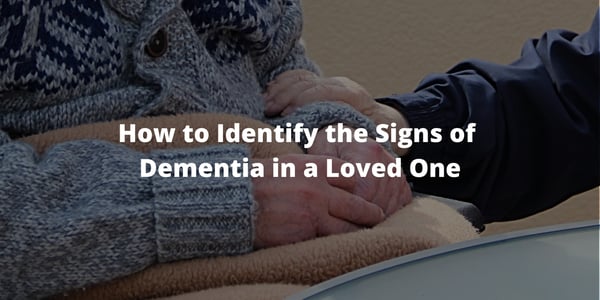Our bodies go through a natural process of change as we age. These changes can impact our mobility...
10 Signs Your Loved One is Ready for Memory Care
Ted had always looked up to his father as a tower of strength and inspiration. Often laboring seven days a week for decades to build a successful small business, he still found time to coach sports teams for Ted and his three other children.
Ted's dad and mom were able to retire comfortably at an age when they could still enjoy an active lifestyle. They caught up on all the travel and other leisure activities they put off during their working years. After enjoying this wonderful life for 17 years, Ted's mom was diagnosed with ovarian cancer. She was gone in a matter of months.
His dad held up well despite feeling devastated. After a couple of years, he almost seemed to be his old self. However, Ted noticed some changes. A fastidious dresser all his life, his dad began to neglect his appearance. It wasn't surprising to find him in the middle of the day wearing the clothes he slept in the night before. Also, as a business owner, he had expertly managed his finances over the years. Now Ted was finding past due bills.
Ted came to the realization his dad was having memory and cognition issues. After a series of doctor visits, it was clear his dad needed a memory care living arrangement.
Ted's story is one example of a scenario faced by many families of older adults. However, it may be difficult for adult children to admit a parent is suffering from memory and cognition problems. One reason is some older adults with memory deficits can be otherwise healthy. This seems to make it easier for families to deny there are problems.
Another reason is denial due to a feeling of shame about dementia and memory loss. Due to common misunderstandings about these afflictions, they have acquired a vicious stigma that leads to needless suffering due to delays in seeking treatment and support.
Families who educate themselves about memory and cognition issues are better prepared to seek assistance sooner. Here are ten signs that a loved one may benefit from memory care:
Top 10 Signs Memory Care May be Right for Your Loved One
-
Memory
The hallmark of a possible need for memory care is, well, memory difficulty. This is not the occasional absent-mindedness that many of us experience in a modern society full of distractions. Instead, the memory issues of more significant concern are those that cause safety or health risks. For example, frequent forgetting while cooking with a stove or oven can be a fire risk. Also, forgetting one's location when driving can be a danger to oneself and other drivers.
-
Personality Change
Most of us are consistent in our personalities over the years. Yet, when an older person suddenly acts out of character, it can be unnerving, especially when negative behavior erupts. Depression, anger, and paranoia can result from memory or cognition loss. These negative emotions may arise because victims perceive unfamiliar changes in themselves, causing fear and stress due to feeling out of control.
-
Housekeeping
 When an ordinarily meticulous home becomes dirty and shabby, this could be a tip-off to a memory problem. Care must be taken before jumping to conclusions, however. Sometimes physical ailments like lack of mobility or vision impairment play a role in uncharacteristically poor housekeeping. Families need to consider all possible causes for this situation.
When an ordinarily meticulous home becomes dirty and shabby, this could be a tip-off to a memory problem. Care must be taken before jumping to conclusions, however. Sometimes physical ailments like lack of mobility or vision impairment play a role in uncharacteristically poor housekeeping. Families need to consider all possible causes for this situation. -
Personal Hygiene or Self-Care
Changes in the appropriateness and condition of clothing and basic hygiene may signal the onset of dementia symptoms. Is the loved one able to dress independently? Are they bathing appropriately? For women, are they able to apply makeup according to their usual style? For men, are they able to use the toilet as usual? Adverse changes in these and other personal care areas must be examined. Another self-care problem can be poor nutrition due to an inability to remember to buy food, eating an unbalanced diet, or forgetting to eat.
-
Finances
-1.jpg?width=300&name=pexels-andrea-piacquadio-3823488%20(1)-1.jpg) A key area to be closely monitored for trouble is the older adult's financial situation. Seniors too often become targets of scammers who want to relieve them of their assets through various forms of fraud. Even legitimate charities sometimes become the beneficiaries of improper donations from victims with dementia. On the other end of the spectrum are circumstances where bills go unpaid. This can be especially serious in the case of insurance premiums, where a policy lapse due to nonpayment can cause significant financial havoc. Families should consider power of attorney arrangements with vulnerable older relatives so finances don't go out of control.
A key area to be closely monitored for trouble is the older adult's financial situation. Seniors too often become targets of scammers who want to relieve them of their assets through various forms of fraud. Even legitimate charities sometimes become the beneficiaries of improper donations from victims with dementia. On the other end of the spectrum are circumstances where bills go unpaid. This can be especially serious in the case of insurance premiums, where a policy lapse due to nonpayment can cause significant financial havoc. Families should consider power of attorney arrangements with vulnerable older relatives so finances don't go out of control. - Communication
If an older adult experiences changes in the ability to communicate either by speaking or writing, memory or cognition problems may be a possible culprit. However, care needs to be taken here, as well. A stroke can cause the same difficulties. If speaking or writing ability degrades quickly, it might be a stroke, and medical help should be sought immediately. Click here to learn more about tips to communicate with your loved one with dementia. -
Social Withdrawal
 A common symptom of dementia is social isolation that results in loneliness. Victims often have difficulty conversing, so involvement in typical social interactions becomes increasingly difficult. As social isolation develops, it leads to loneliness. While memory and cognition problems are not "mental illness" as commonly defined, mental/emotional illness can be a secondary impact.
A common symptom of dementia is social isolation that results in loneliness. Victims often have difficulty conversing, so involvement in typical social interactions becomes increasingly difficult. As social isolation develops, it leads to loneliness. While memory and cognition problems are not "mental illness" as commonly defined, mental/emotional illness can be a secondary impact.Click here to learn more about combatting loneliness and its risks!
-
Wandering
Wandering is a classic advanced dementia symptom. Sufferers cannot understand where they are or perceive they are somewhere else. For example, someone might believe they need to get home to their parents even though the place and people no longer exist. This behavior can be extremely hazardous. There are many documented cases of dementia victims dying of exposure after wandering away from shelter.
-
Incontinence
Although there can be many causes of incontinence, memory, and cognition issues can be contributing factors. Family caregivers have a long list of duties when it comes to memory care. Incontinence issues make the job that much more challenging.
-
Changes to Normal Rhythms of Life
Overall, detecting memory and cognition issues is a process of being aware of many changes. How is the loved one different? What might be causing these changes? There may be many subtle changes that, taken individually, would not be concerning. However, taken together, a pattern may form that signals a bigger problem is brewing.
If a family has concerns about a loved one regarding memory issues, a first step is visiting the doctor. Medical personnel, especially gerontologists, can screen for problems. They can refer to other specialists like social workers and occupational therapists who help further define the situation.
In 2017, a blood test that screens for Alzheimer's disease hit the market. Although it is not yet FDA-approved, doctors can order the test for patients over 60 who show symptoms. If such tests become mainstream, the need for expensive brain scanning to diagnose Alzheimer's and or dementia could significantly be reduced.
Families who educate themselves about the signs of memory and cognition loss will be better prepared to quickly obtain treatment and support for their afflicted loved ones. The quality of life for such older adults could be considerably enhanced with the right measures taken at the right time.
Not sure if memory care is right for your loved one? Check out our recent blog, 10 Signs Your Loved One is Ready for Assisted Living!
Find more information on the Housing Resources and Long-term Care Resources pages.
Related Content:






